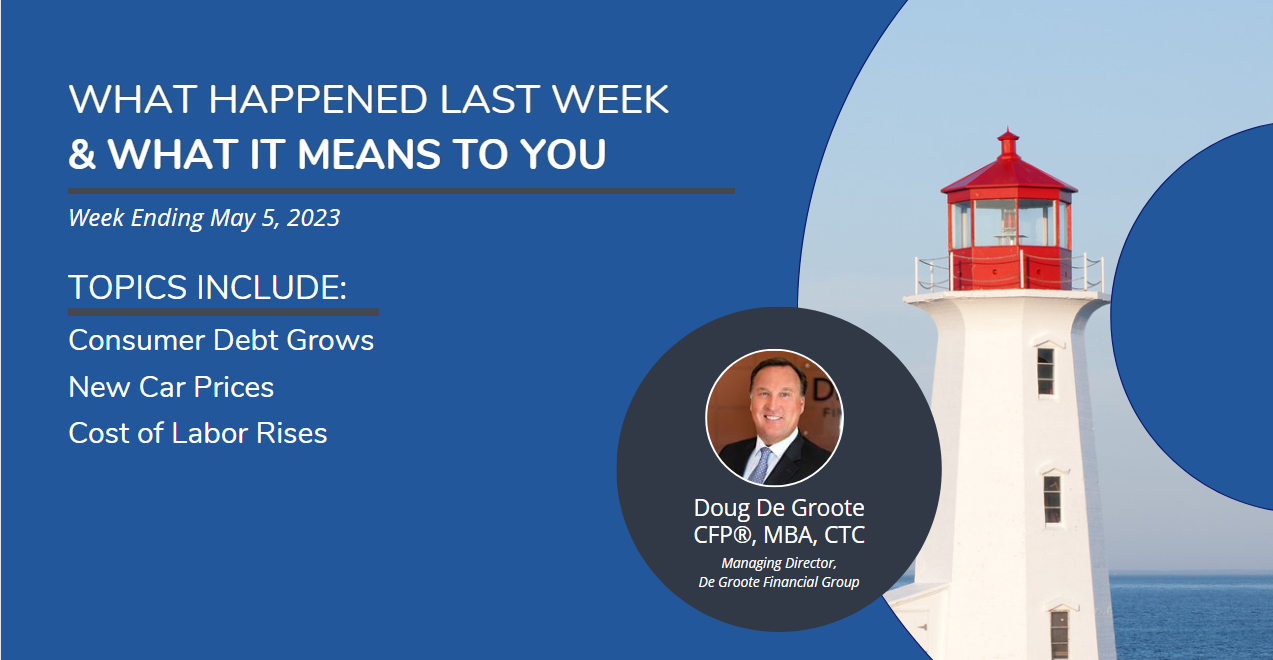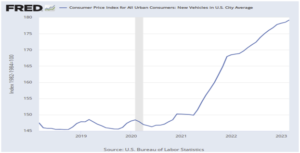
What Happened Last Week and What It Means to You: May 11, 2023
April nonfarm payrolls increased by 253,000…There were some sizable downward revisions accompanying the April employment report that combined left employment in February and March 149,000 lower than previously reported.
What does it mean – According to the Bureau of Labor Statistics, the 3-month average for total nonfarm payrolls fell to 222,000 from 295,000. March nonfarm payrolls revised to 165,000 from 236,000. February nonfarm payrolls revised to 248,000 from 326,000. The Fed is hoping that this could signal a soft landing as they continue to raise rates to fight the continued pain caused by reckless spending by the government.
The labor force participation rate held steady at 62.6%…Unemployment at record lows.
What does it mean – Initial jobless claims continue to run well below levels seen during prior recessions (i.e., north of 375,000) since 1980. Many folks are leaning on the gig economy instead to find income and gain flexibility. According to Gallup and Statista polls, around 36% of US workers (approximately 57.3 million people in total) were part of the gig economy before the pandemic. As of 2023, 73.3 million freelancers are estimated to work in the USA. This trend continues to grow and is estimated to be 76.4 million by 2024 according to Statista. This “gig” economy explains the massive difference in the employment and participation rates from prior recessions.
Cost of labor continues to rise…According to the Bureau of Labor Statistics, employment costs continue to rise.
What does it mean – The Bureau of Labor Statistics reported that labor costs didn’t show any meaningful signs of deceleration. On a 12-month basis, compensation costs for civilian workers increased 4.8% versus 4.5% in March 2022 while benefit costs increased 4.5% versus 4.1% in March 2022. Wages and salaries were up 5.0% versus 4.7% in March 2022.
Consumer debt grows… Revolving credit increased by $17.6 billion to $1.239 trillion. Nonrevolving credit increased by $8.9 billion to $3.611 trillion.
What does it mean – Consumer credit increased at a seasonally adjusted annual rate of 5.4% in March. Revolving credit increased at an annual rate of 12.3%, while nonrevolving credit increased at an annual rate of 3.1%. Consumers continue to offset massive inflation with the benefit of increasing wages and continued dependency on credit.
New car Prices…Ouch!! Bad economic and environmental policy is on a roll.
What does it mean – Can we go back to the way it was? New and used car prices are continuing to climb at a rate unseen since 1984, the last peak in interest rates. Accompanied by massive inflation, cost of employment and higher standards and more restrictive CAFE requirements put in place by unelected bureaucrats at the United States Department of Transportation. These actions are costing taxpayers billions in subsidies as car prices become out of reach for most of America. Not to mention our Military is going to be forced to replace all non-combat vehicles with electric vehicles by 2035. Through another stroke of the pen and bad policy, the American taxpayer cannot afford, the Biden administration is forcing the entire non-combat fleet of vehicles to be electric by 2035. HMMM…I am sure that won’t add pressure to the already stretched supply chain, further increasing costs to the American consumer and the American taxpayer. These actions by your government and unelected bureaucrats are pushing the average consumers to look towards alternatives, hold on to less efficient cars, and making our roads less safe as the American public will be forced to hold on to cars longer and put off repairs as they cannot compete with government for the vital parts and supplies to purchase new cars or fix their current vehicle. Obviously, these policies are made by irreplaceable government officials driven around in new cars paid for by your tax dollars in the name of saving the planet.
One needs to ask themselves and their congressman/woman and senator, why should the government or us citizens pay the wealthiest part of our population in the form of tax credits to buy electric vehicles subsidized by the middle- and lower-income citizens?
The Washington Post reports that, “according to the most recent data from the 2021 Consumer Expenditure Survey, this has created a car-gap Spending on new cars by the lowest 20 percent of earners has fallen to its lowest level in 11 years. While spending on new cars by the top 20 percent has risen its highest level on record, going back to 1984.”.
Since March of 2021, used car prices are up 20.3 percent, according to the consumer price index.
Coincidence? See “1984” referenced above. Or maybe George Orwell knew something when he published 1984. The explosion of car prices can be clearly seen in the chart below.

U.S. Treasury Secretary Janet Yellen warns of a possible “constitutional crisis”… Just in case Janet Yellen and the White House need a refresher on how our Constitutional Republic works. The ball is now in their court.
What does it mean – According to the Heritage Foundation, “The budget process provides the framework for the regular and orderly debate of fiscal issues with the goal of guiding legislative action. It determines the steps that are necessary for adopting a budget and for adopting or changing legislation. A properly functioning budget process should encourage debate on fiscal issues and set in motion negotiations over the trade-offs and considerations involved in congressional spending and taxing.”
Yet, many senators and Congressman do not want their name tied with specific issues and hide their intent behind massive omnibus bills and a bastardized process that stinks of corruption and does nothing to protect the taxpayer from out-of-control government spending. These elected leaders are too embarrassed by their own actions and greed, few are willing to debate their unique issues, concerns or needs and instead work together to create a budget that is thousands of pages long and filled with pork leading to the massive debt we have today.
Instead of responsible leadership, the last 30-40 years has seen our individual debt grow from $10,000 per person in the early 90’s to over $100,000 that each American now owes to our National Debt (over $31 trillion and counting).
Congress has ignored budget rules and deadlines, allowing our budget process to morph into ad hoc funding decisions in response to self-imposed crises. Much like what Janet Yellin is “crying” about today. This “sky is falling” mentality has led to an ongoing cycle of fear mongering about possible defaults and continuing resolutions and omnibus appropriations bills that lack accountability and fail to provide sufficient oversight. This bastardized process set up by a lazy and unaccountable elected class fosters and promotes a system that allows for unchecked spending and encourages the unfettered growth of federal government programs.
There is an old saying on Wall Street by Ed Seykota “the trend is your friend until it bends.” Martin Zwieg shortened it to, “The trend is your friend.” Either way this trend of big government and lack of accountability has been no friend to the American taxpayer but certainly has enshrined millions of our citizens into government programs trapping generations in a lifestyle dependent on the taxpayer.
Time to Bend the Trend of Big Government!!!
Let’s roll America!!
Doug De Groote, CFP®, MBA, CTC
Managing Director

De Groote Financial Group, LLC is a federally registered investment adviser that maintains a principal office in the State of California. The information contained in this message is confidential, protected from disclosure and may be legally privileged. If the reader of this message is not the intended recipient or an employee or agent responsible for delivering this message to the intended recipient, you are hereby notified that any disclosure, distribution, copying, or any action taken or action omitted in reliance on it, is strictly prohibited and may be unlawful. If you have received this communication in error, please notify us immediately by replying to this message and destroy the material in its entirety, whether in electronic or hard copy format.


